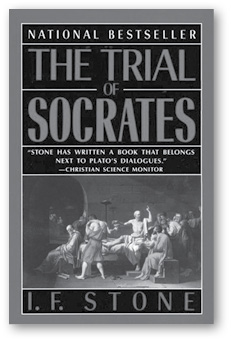Second wind
I’ve been plugging away reading in Plato’s Socratic dialogues and the book The Trial of Socrates by I. F. Stone. The first thing I say about the dialogues—it is remarkable literature. Now that I’m actually paying attention to it and reading the dialogues themselves more than 60 years after a college degree in philosophy, I realize now that they are entertaining—very entertaining.

One key to enjoying them is reading aloud: playing the parts yourself enhances the fun through participation and understanding. Reading out loud changes the position of the reader to behind and with the words rather than the object of the words only. The Bible was created out loud. Read out loud from Job; play the parts.
I have passed from sketchy knowledge about Socrates and Plato to reading the text itself. It’s a joy. A lot of fun. I have read maybe most of 10 dialogues so far; there are 35. We’re talking about Plato’s Socratic dialogues, there is also the dialogue written by Xenophon as an “Apology” defending Socrates at his trial.
There is much interesting stuff, like finding out that Socrates was not a democrat and that he thought it was a mistake to let the lower classes vote or express their opinions because they did not know enough to do things or make good judgments and lacked understanding. The city or society should be ruled by “those who know”—Philosophers—we philosophers, should we claim to be such.
The noble and legitimate purpose here being to abide, that is to live, in the understanding and appreciation of truth, beauty, goodness, love, and the like. Socrates and Plato agreed these are the things that are really real. Ideas are so much more real than the “accidental” particulars.
However, I find myself not wanting to substitute an ideal kiss for a real one. But when a real one is missing, the ideal is still available. The appreciation of beauty and truth does keep the liberal arts front and center.
I didn’t realize Socrates thought freedom of speech was the prerogative of the upper class only. He actually says these kinds of things.
Nonetheless, back to the entertainment and the activity around Socrates and Plato and this group of philosophers and the literature.
The Agora, where peripatetic philosophers gathered, is the source of much of this. I’ve been in Athens, in the Agora. It is not large. (I am assuming that our tour was standing in the real thing). It was nice. I chuckle as I picture men in robes walking back and forth with arms over shoulders shooting the breeze.
Anyway, how did Plato’s dialogues get published? How were they copied and produced? How were they sold and distributed? I haven’t found out. Jump in here if you are one of those “who know.”
